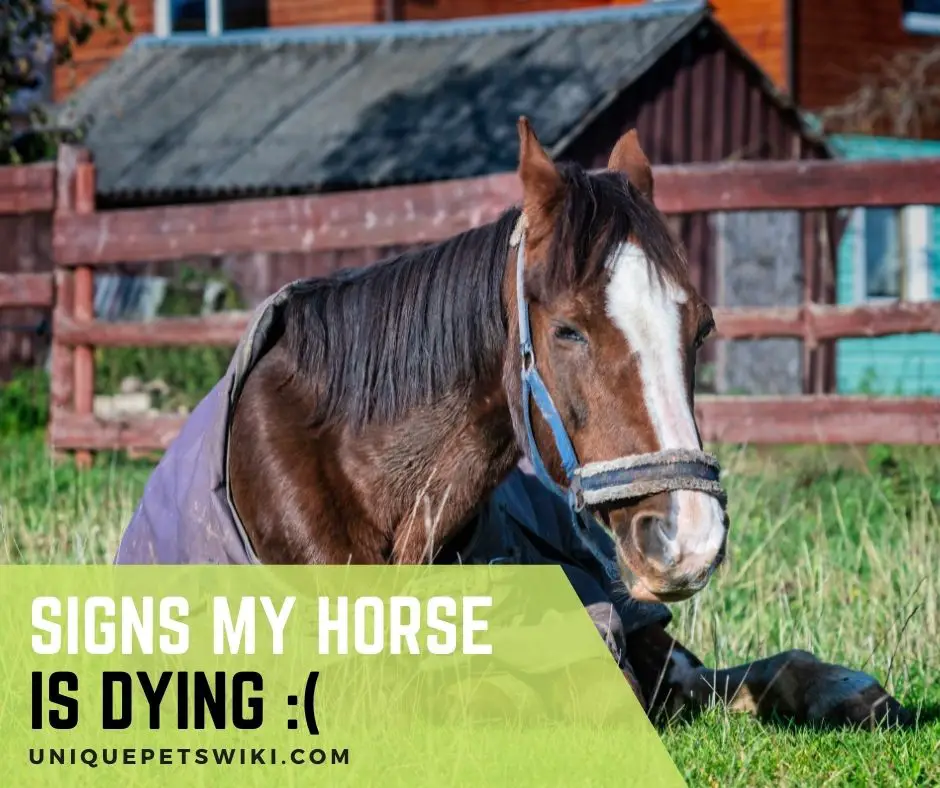Horses are wonderful pets, and many pet owners keep them for several reasons. They can be a friend, working partners, adventure buddies, and so on. Furthermore, horses are hardy creatures and can live up to around 30 years old.
Although horses have a long lifespan, a time will come when you say goodbye to them whether from an injury, illness, or old age. A responsible horse owner needs to know the signs of sickness in horses to help increase their lifespan and to make them happy.
In this article, we will highlight the various signs of a dying horse, how you can treat your horse at home and how you can take proper care of your horse.
Contents
How to Spot the Signs of A Dying Horse and Provide the Best Care Possible
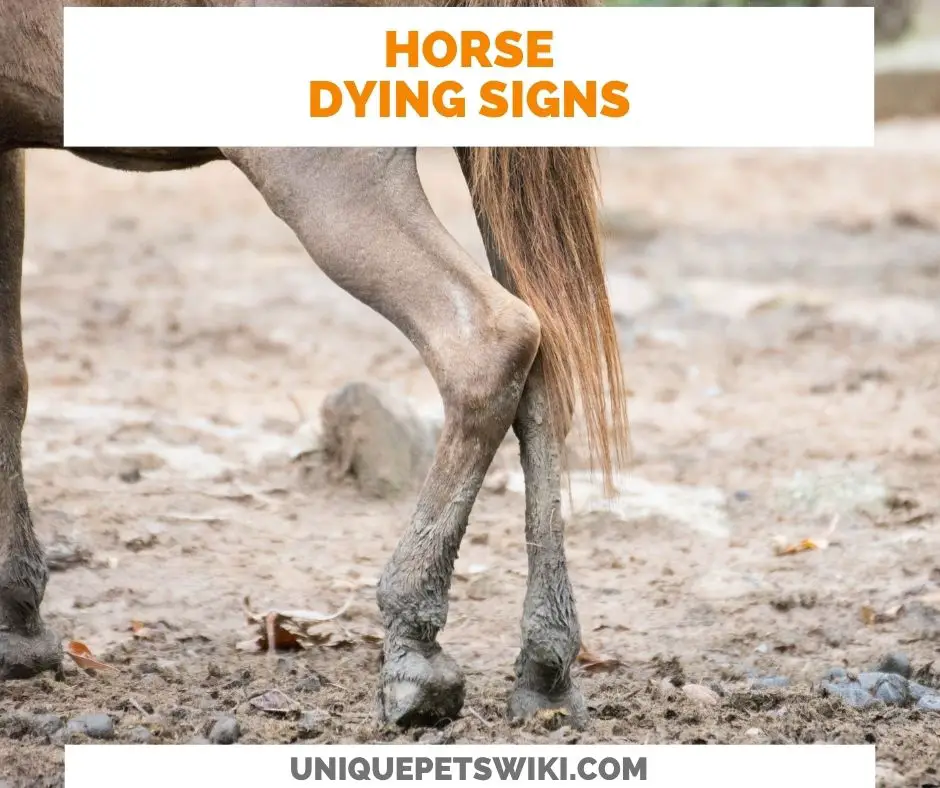
Horses have a decent lifespan and can develop health issues if you do not take good care of them. However, you can detect that your horse is sick if you notice a change in your horse’s normal behavior.
Some of the signs that can help you determine that your horse is dying are stated below.
- Loss of appetite and refusal to eat for a long time.
- Loss of muscle mass
- Sunken eyes
- Swayed back
- Difficulty standing up
- Your horse responds less to exercise
- It is less excited about seeing you or other horses
- Rough coat
- Abnormal passing of urine
- Drooling or dropping food from their mouth
- Difficulty when breathing
- Loss of weight
- Resting a foreleg
Signs of A Sick Horse
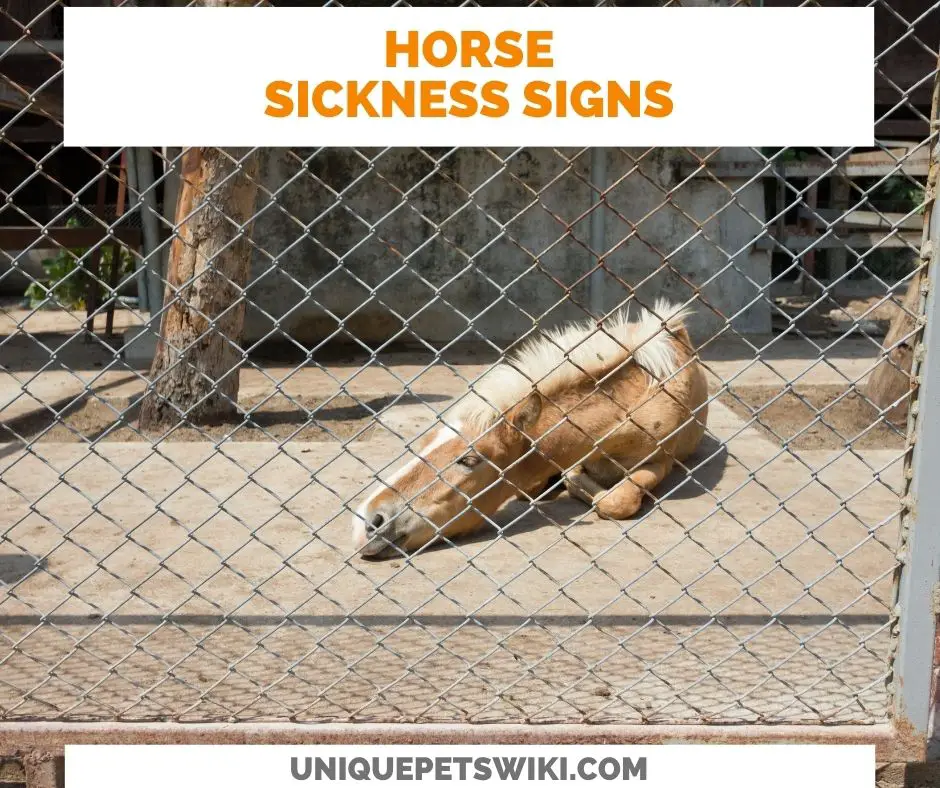
Some of the signs that you can use to detect whether your horse is sick are stated below.
Total Lack Of Movement
Horses are generally active and social creatures. Your horse may be suffering from pain or there is something physically wrong with it if they are unable to move.
Furthermore, when a horse is in a lot of pain, they usually hide in a secluded place to protect itself from pain.
Whenever you notice that your horse is not moving, you can check it for leg injuries or other painful ailments.
However, if the pain occurs because of something else, your horse will be able to move easily after the pain has reduced.
Cranky With Other Horses
The way a horse interacts with other horses can help detect if it is suffering from an illness.
If you notice that a horse does not move with its buddies or lags behind while it is usually at the front, it may be suffering from an illness.
Furthermore, something may be wrong with your horse if every other horse is in the middle of the pasture while it just stands close to the gate.
Read more: https://thehorse.com/160103/why-is-my-horse-aggressive-in-the-stall/
Fever
You can easily detect that your horse has a fever and it is listless. Furthermore, one of the signs that a horse is fighting off an infection is fever.
Once you notice that your horse has a fever, you should try to take the horse’s temperature and be on the lookout for any other signs.
Read more: equusmagazine.com
It Has A Dark Red Or Black Patches On Its hoof
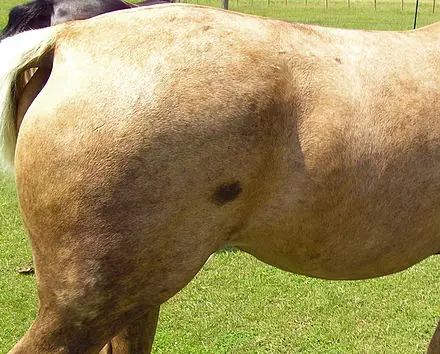
Your horse is sick if you notice dark red or black patches on your horse’s hoof plus discharge or foul smells.
When you notice this sign, your horse may be suffering from impacted stones or thorns which can lead to lameness if it is not treated quickly.
According to Blue Cross, you should always be on the lookout for loose horseshoes or any splits to the wall of your horse’s hoof.
Full read: https://en.wikipedia.org/wiki/Bend-Or_spots#
Abnormal Ears, Nose, And Eyes
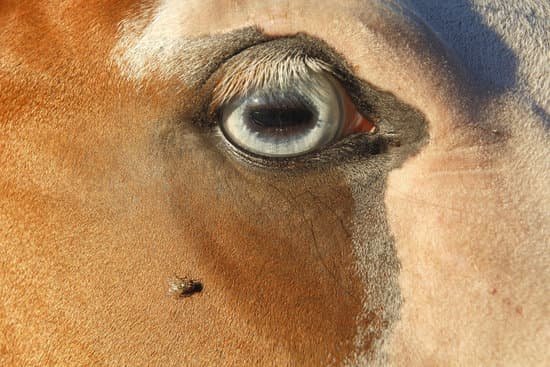
If you notice that a horse with a low head and its ears pinned back, may be suffering from pain and you should try to check it immediately. Another sign of sickness is when you spot a thick discharge from the nostrils of your horse or it has a weeping eye.
Feed Dribbling Out Of The Nostrils
This is a sign that your horse is suffering from a choke, that is, its esophagus is obstructed. When your horse is suffering from choke the chewed feed usually comes out of the nose and the neck muscles will be visible as it tries to swallow the food.
Another illness that can affect how your horse swallows its feed is the paralysis of the pharynx. Once you detect this symptom, you should try to call a vet immediately.
Unsteady Gait
This symptom can occur over a short or long period of time and it shows that your horse is suffering from an illness. Some of the signs of unsteady gait are swaying, lack of coordination, and weakness.
Dry Peeling Skin
A healthy horse usually has soft supple and glowing skin. However, once your horse has dry peeling skin or coat with dry or greasy hairs then it may be suffering from an illness. This is why it is important to groom your horse regularly to help maintain healthy skin and coat.
Teeth
You can determine the health of your horse just by checking its teeth regularly. This is because horse teeth can wear out over time. However, you can determine if your horse is sick if it has mouth sores, foul breath, drooling, etc.
Some of the signs that your horse has dental issues are swollen jaws, spilling chewed food, chewing with one side of its mouth, etc.
Coughing
You will notice that the horse has different coughs in your basic horse care. Your horse can cough if it is cold and you will also notice watery mucus from its nose when this happens. However, if you don’t treat this condition, the cough will become rapid and the discharge will turn yellow.
Your horse can also cough if it has bacteria or allergic reactions. Once you notice that your horse is coughing, you should try to quarantine the horse to help keep the other animals safe.
Itching
This is a common sign of sickness in horses, especially during the summer. This shows your horse is suffering from itching caused by a female midge. You will notice that your horse gets itchy along its back, mane, and tail.
You need to treat this immediately because your pony can get wounds and bruises by scratching itself.
Bowel Changes
One of the common ways that you can use to detect whether your horse is sick is through its poop. If you notice that your horse is not pooping, it may indicate that it has a partial or full intestinal blockage.
However, if your horse poop is hard and dry, this may indicate a decrease in water intake. Your horse may also have diarrhea if you add fresh green grass to its diet in the spring. However, if your horse has runny poop, then it may be caused by Potomac fever.
Once you notice any changes in the bowel movement of your horse, you should try to contact the vet for diagnoses and treatment.
Can You Treat A Sick Horse?
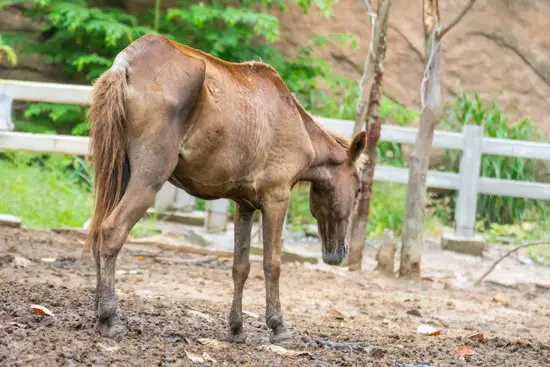
You can treat a sick horse if the sickness has not progressed to an irreversible stage. One of the important things that you should do when treating a sick horse is to always follow the instructions of your vet.
Another important thing when treating an unhealthy horse is cleanliness. Furthermore, you can give your horse gentle grooming each day if the horse is not too sick. You will also need to provide a stable rug on your horse to keep it warm during autumn or winter.
It is also important that you provide your sick horse with balanced nutrition. This is because stress from sickness can increase the caloric need of your horse due to the increase in its catabolism.
You should also provide fresh water to our horses at all times because dehydration can affect their recovery.
The Ill Symptoms That You Can Treat At Home
You can treat some horse’s ailments at home and your pony will feel healthy and happy again.
However, you will need to consult a vet first to give you advice on the best way to treat your horse at home or when to bring it for a checkup.
Some of the ill symptoms of horses that you can treat at home are stated below.
Colic
This is a common digestion system problem that affects horses. Your horse can have colic if it does not drink enough water, has untreated dental problems, or eat enough roughage.
Some of the signs of colic are restlessness, gut pain, anxiety, sweating, laying down more than usual, lack of appetite, etc.
You can prevent this disease by ensuring the water and food supplies are clean. You should also ensure that you provide your horse with a balanced diet, and float your horse’s teeth once in a while.
Once you detect signs of colic in your pony, you should call a vet for professional help. You can then walk your horse to help reduce pain while you wait for the vet.
Tetanus (Lockjaw)
Tetanus in a horse is caused by the bacterium Clostridium tetani, found in soil and manure. Your pony can get infected by tetanus if it has an open wound. Some of the signs that your horse is affected by tetanus are stated below.
- Difficulty moving and eating
- Sweating
- Muscular stiffness
- The tail is usually held straight out.
- Spasms and convulsions. Etc.
You can prevent this by vaccinating your horse. You should also have good first aid practices such as keeping your pony’s wounds clean, removing any dangerous items that can lead to injury, etc.
Common Cold
This is a viral infection and your horse can easily contract this if it comes in contact with other infected horses. Some of the signs of a common cold are cough, swollen lymph nodes, nasal discharge, fever, exercise intolerance.
You can prevent your horse from the common cold by giving it a vaccination. You should also isolate new horses at the barn from others. You can treat a horse with a common cold by isolating it to a dust-free area and consulting your vet for more guidance.
Ringworm
This is caused by a fungus and it quickly spreads from one horse to the other. At the initial stage, you will notice tufts of raised hair on your horse and this later falls off and leaves lesions.
You can prevent the spread of ringworm if you do not use the same tack for different horses.
You will also need to pay attention to the hygiene of your horse. Furthermore, you should isolate a new horse from the others until you are sure of its health. However, you can treat an infected horse with an antifungal wash and clipping off the infected hair.
You should properly clean the barn and tack that you use for the infected horse to avoid the spread of the illness.
Equine Herpesvirus (EHV)/Rhinopneumonitis
This is a highly contagious virus that spreads through nasal secretions, contaminated feed and water utensils, and contact with infected horses.
If EHV is left untreated, it can lead to paralysis, respiratory infections, inflammation of the spinal cord, abortions, and even death in your horses.
Some of the signs of EHV in horses are stated below.
- Loss of coordination
- Urine dribbling
- Nasal discharge
- Loss of its tail
- Lethargy
- Weakness of the hindlimb
- Head tilt
- Not able to stand on its own
- Leaning against a wall to stay balanced.
Once you notice this, you should immediately isolate the affected horse to help prevent the spread of the illness. You can also consult your vet for further guidance on how to treat the virus.
Arthritis
Osteoarthritis also called a Degenerative Joint Disease (DJD) is a common disease in horses. It develops slowly as the joint tissues of your horse become inflamed while the joint cartilage becomes damaged and worn down.
Arthritis is a very painful disease and can affect the range of movement in the affected joint. Some of the signs of arthritis in ponys are
- Lameness
- Stiffness
- Swelling of the affected joints to look bigger
- Heat in the joints.
You can prevent arthritis in your horse by monitoring your horse’s weight, taking time to warm up and cool down your horse before and after exercise, and riding your horse on varied surfaces.
However, there is no absolute cure for arthritis in horses but you can manage the condition to reduce the pain. You can consult your vet for the best way to go about this illness.
When do You Need A VET For Your Horse?
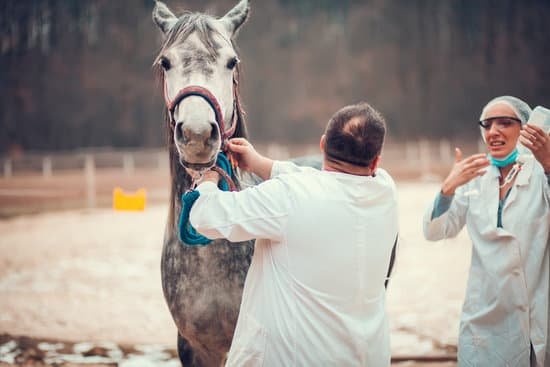
Although horses are hardy creatures, they are susceptible to a wide range of illnesses. However, here are some guidelines on the best time to consult a vet when your pony starts to show signs of illness.
You can consult your vet if there is a presence of uncontrollable bleeding, lacerations, abdominal pain, injury to the eye, foreign objects protruding from their body, aggressive behavior, chronic lameness, difficulty in breathing, is actively in labor for over 20 minutes without success, neurologic signs, etc.
The best rule that applies is that whenever you are in doubt, you should try to consult your vet immediately.
Read more: https://thehorse.com/128704/when-to-call-the-vet/
How To Help Prevent Sickness In Horses?
Some of the ways that you can prevent sickness in a horse are stated below.
- Provide them with proper nutrition
- Quarantine newly arrived horses for about 14 days before introducing them to other horses.
- Quarantine sick horses to prevent the spread of disease
- Vaccinate your horse
- Good first-aid practices
- Ensure proper hygiene in the farm
Wrapping Up
Although horses are sturdy creatures, they can be affected by various illnesses which you can detect early through regular care.
Furthermore, most of the health conditions that affect horses are not usually severe but can have adverse effects if you don’t treat them immediately.
Final thoughts
I am William Nathan, and honestly, I don’t own a horse. I have been teaching pet owners about pet dying signs for a year. Some of my readers suggest that I should write an article informing them about horse dying signs.
Read my series on pet dying signs here.

They notice that my writing about “signs to tell a pet is dying” is very easy to understand. That is why I spend 6 hours doing research online to come up with this article.
If you notice any misleading information please feel free to contact Eric for any suggestions.
Many thanks to online references:
https://www.besthorserider.com/signs-your-horse-may-be-dying-and-what-you-can-do-to-help/
https://agapepetservices.com/horse-dying-saying-goodbye/
https://eclectic-horseman.com/signs-of-sickness-how-to-read-your-horses-behavior/
https://sourceofhorse.com/signs-your-horse-may-be-dying-and-what-you-can-do-to-help/
https://wagwalking.com/horse/condition/aging
https://www.horse.com/content/health/signs-of-horse-illness/
https://www.horseproperties.net/blog/10-warning-signs-horse-sick/
https://www.learn-about-horses.com/caring-for-a-sick-horse.html
equestroom.com 10 common horse diseases
https://www.mannapro.com/equine/top-5-most-deadly-horse-diseases
